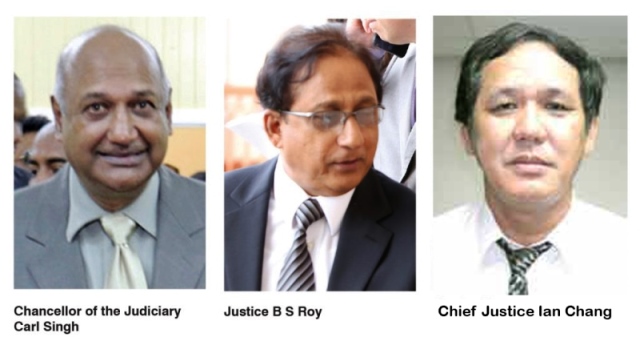To the extent that the Country’s Constitution was constructed on the platform of democracy…a concept referenced throughout its preamble, its body and its amendments …it is understood that there would be term limits to governance; otherwise Guyana would be a Dictatorship.
And in Guyana, to talk Constitution without its correlation to the politics of race would be a conversation that is inherently hypocritical, since race stands at the crossroads of identity and socio – political structure with difference framing inequality.
Without the typical regurgitation that is now deployed for more toxic confrontation than instruction, there is hardly a valid argument to discount the fact that the years between 1964 -1970 saw Guyana, under Burnham, develop a relatively nimble economy and a comparatively satisfied nation, both of which changed for the worse with the implementation of socialist programs destined to fail because they were, substantially, more rhetoric than reality.
Without revisiting details that remain palpable because they have, at the very least, generated and sustained insurmountable racial division, we can stipulate that the Constitution promulgated by Burnham and officially adopted on October 6th 1980, created Presidential powers and ruling Party paramountcy that effectively challenged the democracy of its predecessor, the 1966 Constitution but maintained the description of ‘democratic and secular state’ which gave us all hope that Cooperative Socialism, whatever that is, was not exactly a Dictatorship.
It would be equally instructive to note that the Opposition Party, headed by Cheddi Jagan, remained a staunch and unrelenting critic of the politics of Cooperative Socialism, damning the Constitution that expanded the powers of the Executive President and the assertion of party paramountcy as essential gears for Cooperative Socialism.
Then in 1992, after nearly thirty years of castigating government from his perch in the Opposition, Cheddi was declared the winner of the General Elections and ironically, though not surprisingly, maintained the ruling apparatus built into the 1980 Constitution that he had condemned with much vehemence. Now the Party that had paramountcy was his, the PPP and his governing policy embarked upon a course of administration much like the type he had spent decades criticizing.
In a show of both make over and retention of old principles, Cheddi, at once, declared that he was still at his core a Marxist/Leninist, while insisting he was Gorbachev before Gorbachev, flung his arms around glasnost (openness) and dropped a kiss on perestroika (reform) – guided by a Constitution that he said did none of these things…
a contradiction that exposes the general mismatch between his reputation for ideological rigor and integrity and the reality that his positions were too often nationally divisive, morally inconsistent and ethically questionable…driven by a communism that communed mostly with his race.
It might be of further import to reinforce that under his Presidency and that of Janet’s, there were several Constitution reforms commissioned, none of which ever repealed the over- extension of partisan influence on government operations or the over reach of Presidential executive powers that the PPP once saw as a “debilitating autocracy which rigged successive elections to retain political power and party paramountcy.”
Politicians are disinclined to place conscience over consequence when they stand to benefit from it.
Guyanese remained collared by, yet, another leader who saw his individual morality as an independent variable, not aligned to the connotation of the Constitution and its Amendments with the punctiliousness he had expressed when he was in the Opposition.
So, Constitutional culture became its loose interpretation for political expedience – which brings us to the to the current review by the Caribbean Court of Justice for Guyana’s Constitutional Amendment to Act 17 (see page 4) pertaining to term limits which reads explicitly (2)A person elected as President after the year 2000 is eligible for re-election only once …… (3) A person who acceded to the Presidency after the year 2000 and served therein on a single occasion for not less than such period as may be determined by the National Assembly is eligible for election as President only once…assented to by Bharat Jagdeo, then President.
Without suggesting that there may have been deliberate partisan injection in the interpretation by Chief Justice Ian Chang, Chancellor of the Judiciary Carl Singh and Justice of Appeal B. S Roy, it would be prudent to contemplate why an interpretation so elementary and assented to 17 years prior by then President Jagdeo would now become an issue complex enough to befuddle the minds of Guyana’s final arbiters so thoroughly that the case has to go to the Caribbean Court of Justice, CCJ.
For us , the role of the Judiciary in a democratic society is more than just a dichotomy between the unchecked majoritarianism of those of a specific political hue and the gratuity of judicial intervention to protect the rights of the rest of the people by those in minority. We expect them to apply neutral principles of law to resolve disputes that impact us all – as they have sworn to do, irrespective of their leanings.
I mean, we matter and the fact that our Chief Justice, Chancellor of the Judiciary and Justice of Appeal couldn’t interpret ‘eligible for election as President only once’ to mean that a person couldn’t run for office of President after serving 2 terms invokes due alarm.
The very purpose of the Constitution, at all, is to withdraw the potential for us to be overburdened by the vicissitudes of political controversy, from the wheelings of judicial mavericks, to place our right to elect a leader to serve no more than twice- as in two times- in our lifetime beyond the reach of judicial majorities and officials that may be infected by partisan loyalty and to establish these rights, our rights, as legal principles to be applied by the courts.
And if our on-shore legal lifeline would posture with the simplicity of “eligible for election as President only once”, it would be prudent to think that amidst all of the Law’s meandering, its implication that the will of the whole people is supreme to that of the legislature, will be lost in interpretation.
Not far fetched at all.
If we’ve been paying any attention, we’d note that the Constitution has become both the backdrop and the subject for every change politicians make to promote their political idiosyncrasies and partisan ideology…making it both insufficiently democratic and significantly dysfunctional in how it serves or benefits the people.
Frighteningly, it has become the epicenter of every crisis…the current being term limits.
History records where respect for term limits is weakest, there is a waning of democracy… and where term limits have been rolled back, the strongest institutions are generally the military and para military forces.
This typically creates a formula for facism…
…which will be a monumental horror for Guyana…
…and all this at the stoking and provoking of those elements with dynastic ambition, who feel that the reins of government belong in their hands – after showing unmatchable avarice and contemptible mismanagement during the years they delayed elections, ran up national debt, pirated national wealth and disenfranchised blocks of people with wicked purpose and ill intent.
Look.
The sheer quantity of off-kilter statements contained in the media opinions supporting the validity of a third term means that none of them fully register in the fashion they might have if they were delivered one by one.
“ A win for Jagdeo/PPP is a win for the people” emblazons their literature that they distribute with unsolicited regularity.
It is hard not to hear this as portentous, a taunt and reflect on the mortal wound said Jagdeo has already inflicted on the health of the Republic.
What people, we ponder, as we revisit the pirating of national wealth and the constitutionally guaranteed right to work that permanently keeps a specific block of people on the highest tier of unemployment?
It’s a shame that determining Guyana’s right to democracy has to be outsourced, has to go offshore, for foreigners to read and interpret what they couldn’t conceive or write, inspired by the natural sense of birthright, patriotism and that parental instinct to protect.
One of the Brer Anansi tales of our country’s politics is that we all want the same thing.
Stcheups would be contextually appropriate here.
No we don’t. We never really have. This is a talking point we retrieve in times such as now to cover our chasmic divisions in race and by extension politics; to deflect our abiding differences that way too often, in our history, threaten to tear our nation further apart.
The assessment that the Party that needs no coalition is more inclined to selective nativism and active racism is correct but it severely understates the case. Its members consider any person other than its current leader ill-equipped and any party other than itself dangerous – which is the academic definition of singular rule and the dominance of a single race, all of which threaten what’s left of our Constitution, with all of its rammed through amendments that are not wholly embraced but chip steadily away from our motto and the democracy we have earned.
We can find evidence of this Party’s anti- motto views merely by looking at its record and even more evidence of its political psychology in how it systemically denied the constitutional right “to enjoy the highest possible standard of living and quality of life consistent with their work and the possibilities of the country’s resources” during its tenure. To understand how it shapes its ideology you have to understand populism, authoritarianism, and nativism because this Party fires on all three cylinders and with its own local twist of nativism added to this poisonous potion.
Seriously. Only a Party with an anti-national mission would gift acres of land to people of a specific ethnic persuasion and a few of its stooges on 99 year leases – in effect making this group the nouveau landed gentry.
As an aside, we’re still waiting on State Asset Recovery to confirm that it has repossessed this land that has been stolen from the rest of us.
But back to term limits and our Constitution.
Our democracy has been outsourced.
Robed men in another country have been given the task of deciding whether we deserve to enjoy the political freedom we have been granted because an affliction of interpretation has affected the robed men in our own country whose duty it is to interpret.
Our political independence has been on a gradual slide into authoritarianism with the slow and steady erosion of norms like the availability of jobs for all levels of competence and skill and the chipping away of critical institutions like the press which was corralled by the granting of broadcast and print license to specific people; and now the judiciary at the highest level which has difficulty interpreting “eligible for reelection only once” because its expected neutrality has been stricken with a bubonic strain of politics.
To tell us that we may, by act of Constitution, have to endure the political fatigue that comes with one leader and one Party recycled into government is to threaten a loss of freedom.
The era is different and so is the thinking. Dissent is more effective by forcible showing of public indignation. Our democracy, we know, faces the dual imperative of electing a candidate for government or a demagogue for ultimate dictatorship.
And this, this very fulcrum that grants us the leverage to exercise the right to choose our political leaders, is now under assault.
It may be simplistic to expect boots marching in the streets, but there will be a battle for democracy, regardless of the footwear.





